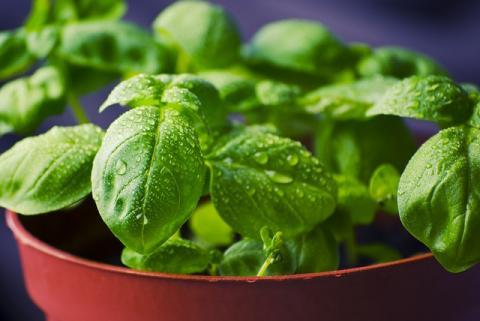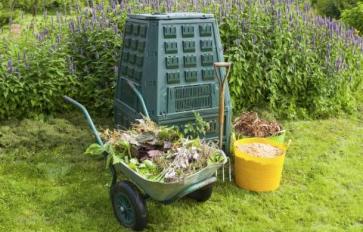
Basil, for you and your garden
From salads to herbal uses to home remedies – basil is one plant brimming with all the goodness of nature. Here’s why it should be in your garden…
Let’s begin with the basics – basil is actually a plant from the mint family. Scientifically known as Ocimum basilicum, the leaves of the basil plant range from the sweet to the downright pungent, but all varieties have excellent medicinal and nutritive properties. Basil’s earliest recorded use was in Egypt for embalming, as well as in India where it was (and is) considered holy and planted in and around temples and used for all religious ceremonies.
It has been around for more than 5000 years but not every connotation basil has had is positive. Throughout history basil has been associated with a host of creepy-crawly things such as snakes, scorpions and even lice with physicians in the 1500s warning that smelling basil could lead to scorpions in the brain! Thankfully, the myths have been debunked and studies are on to prove all its medicinal goodness, though Ayurveda has been using holy basil (tulsi) for centuries to heal various ailments.
Varieties of Basil
There are more than 50 different cultivars of the basil family of plants but you could differentiate most of them into two specific groups. The larger-leafed, mildly pungent Italian sweet basil is what we put in salads and soups, and has more culinary uses than herbal. The Asian varieties are spicier, more pungent and have smaller, sharper leaves – together dubbed as the Thai basils. The Thai basils, especially the indigenous Indian Holy basil, are what interest herbalists the most, for they brim with medicinal properties.
The Health Benefits of Basil
According to herbalists, basil, or rather holy basil, is an adaptogen which means that it helps the body cope better with stress, ageing and oxidative effects. Let’s count its benefits one by one.
- It’s a relaxing as well an invigorating agent: Various studies and research are hinting at using holy basil as an alternative to medical marijuana, pointing at this herb having the ability to treat a host of psychological and physiological medical conditions such as PTSD, insomnia, chronic exhaustion, nightmares, irritability and even depression. It can also work as a memory booster and can even aid people in quitting smoking or alcohol by reducing the stress associated with dependency and withdrawal.
- It has great antibiotic properties: If you are prone to infections, especially of the respiratory tract, or keep getting fevers and colds, then basil could definitely up your immunity, and stimulate the adrenal gland as well – thereby also regulating kidney function.
- It is a good anti-inflammatory aid: Basil can provide fever reduction and sore throat relief, as well as respite from aches and pains as it has anti-inflammatory properties. People suffering from chronic headaches and migraines may also find relief with its long-term use.
- It’s also an anti-oxidant: The very air we breathe poisons us with oxidative stress. Free radicals generated by the oxygen we breathe age us – from cells to organs to skin. Anti-oxidants such as basil tie-up these free radicals and prevent them from causing harm, thereby providing longevity and overall youthfulness.
- It has anti-fungal and germicidal properties: The way it controls bacterial growth, basil can also control the growth of various fungi and germs, thus making it a great elixir for the skin, nails and general bodily health.
- Studies are hinting at it being a good diabetic control aid as well as a heart health tonic: Basil contains powerful anti-oxidant compounds such as eugenol and methyl eugenol, as well as caryophyllene, which together help the pancreas function optimally and make it produce the right amounts of insulin. Eugenol also regulates cholesterol, thus regulating blood pressure and keeping the heart healthy.
How To Eat Basil
Basil can be chopped and added into salads, sauces, chutneys, curries and sandwiches as per your taste, and depending on whether the basil is sweet or pungent. It can be steeped into teas or even chewed and washed down with water for unadulterated health benefits. Remember that overcooking basil kills its healthy properties, so add basil towards the end of your cooking. For teas, boil water and turn off the heat – add crushed basil leaves, cover and steep for 6-8 minutes – consume fresh.
Growing Basil in Your Garden
Basil is a hardy plant and can flourish well with good drainage, adequate sunlight and frost protection.
- Good drainage: Like most plants, basil needs good drainage – stagnant water around basil will kill it.
- Adequate sunlight: Choose a patch that’s fairly sunny but not in the extreme – 3-4 hours of sun will work well.
- Seeds vs. saplings: Decide if you are planting seeds or getting saplings. Seeds need to be scattered and covered lightly with dirt, with water showers once a day. Once they sprout into 4-6 cm saplings, you may transplant them in containers.. For saplings, just tease the ball root a bit before planting them about 6 cm into the soil.
- Protect it from the cold: Even a little frost will kill basil, so remember to move basil indoors to a sunny and warm ledge when it gets cold. You get lots of basil in the summer, so you can always pluck the leaves, dry them and then use the dried ones in the cold weather months. Remember that it’s all about the smell – if the dried leaves have lost their characteristic pungent odor, trash them (or better yet – add them to your compost heap!).
- Harvest it often: Basil grows all the more if you regularly keep pinching off the new leaves – this will make the plant branch more so you get a blooming bush.
- Pinch off flowers: Remember that once basil blooms into flowers, the leaves start losing their flavor. Snip off the flowers and the leaves will get their flavor back in a couple of days.
Basil, for Your Garden
Basil is an excellent herb for you -- a wonderful flavoring agent too. But do you know that basil can also be great for your garden? The same basil essential oil that’s healthy for humans has a smell that garden bugs like to avoid. Planting basil as a companion plant with other produce helps you get bug-free vegetables and fruits as it repels insects such as aphids, beetles, tomato hornworms, mosquitoes and white flies. The plants which can benefit from simply being alongside basil are tomatoes, beans, beets, cabbage, asparagus, chili and bell peppers, eggplants, potatoes, asparagus, oregano and even marigolds.
Good for you and your garden, planting basil certainly resonates with health all through.








